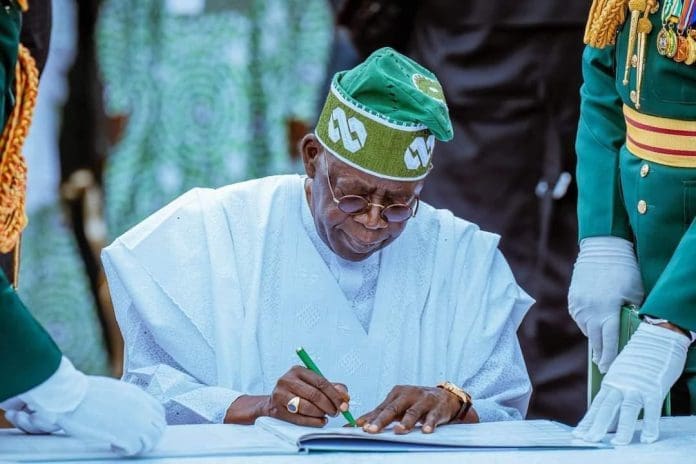A Nigerian man’s desperate plea for President Bola Ahmed Tinubu to “sell Nigeria to China or Ghana” has gone viral on social media, capturing widespread frustration over rising living costs that have pushed basic necessities beyond the reach of ordinary citizens.
The video, posted on platform X, shows the man venting anger over cooking gas prices that have reportedly reached ₦2,000 per kilogram, making even basic meal preparation financially challenging for low income households that represent the majority of Nigeria’s 220 million population.
“Even 1kg of gas is now ₦2,000,” the man said in the video. “I beg you in the name of God, if you can’t control Nigeria again, please sell it to China or Ghana so we can be under another country. You just want to turn the country into something else, and we the poor are the ones suffering.”
While his suggestion that Nigeria be sold to another country reflects hyperbolic frustration rather than serious policy proposal, the sentiment resonates with Nigerians struggling under economic reforms that have dramatically increased costs for fuel, food, and other essentials since Tinubu took office in May 2023.
The president removed fuel subsidies and floated the naira currency shortly after inauguration, moves that economists argued were necessary to address fiscal imbalances but that immediately triggered inflation and hardship for citizens already facing high unemployment and poverty rates.
Cooking gas prices have become particularly contentious because they affect every household regardless of income level. When gas becomes unaffordable, families often shift to firewood or kerosene, which produce harmful indoor air pollution and contribute to deforestation, creating health and environmental consequences beyond the immediate economic burden.
The frustrated man also linked the gas price increase to reportedly ongoing tensions between Tinubu’s government and Aliko Dangote, Africa’s richest man and owner of Nigeria’s largest private refinery. He suggested that political disputes were being allowed to hurt ordinary Nigerians caught in the crossfire.
“Because there is an issue between you and Dangote, you decided to increase the price of gas,” he claimed. “If you can’t control the country, please sell it to Gobe, I beg you. Settle your problem with Dangote because it’s affecting us.”
The reference to Dangote reflects public perception that Nigeria’s economic challenges stem partly from conflicts between political leaders and business elites rather than purely from market forces or policy necessities. Dangote’s $19 billion refinery, which began operations in 2024, was supposed to reduce Nigeria’s dependence on imported petroleum products and lower fuel costs, but implementation has faced various obstacles.
Nigeria’s inflation rate has soared under Tinubu’s administration, with official figures showing food inflation above 30 percent and general inflation in the high twenties, though many Nigerians believe actual price increases exceed official statistics. The naira has lost significant value against the dollar, making imported goods more expensive and driving up costs throughout the economy.
The viral video joins countless social media posts expressing economic frustration, suggesting that patience with reform measures is wearing thin among citizens who see their purchasing power eroding month by month. The question facing Tinubu’s government is whether Nigerians will endure continued hardship long enough to see potential benefits from economic restructuring or whether political pressure will force policy reversals.
Previous Nigerian governments have attempted similar reforms only to retreat when public anger reached critical levels. In 2012, protests erupted nationwide when President Goodluck Jonathan removed fuel subsidies, forcing a partial reversal. Tinubu has so far maintained his reform course despite growing discontent, arguing that short term pain is necessary for long term economic stability.
However, the political calculus grows more complicated as living standards deteriorate. Nigeria faces security challenges including insurgencies in the northeast, banditry in the northwest, and separatist agitations in the southeast, all of which could intensify if economic desperation pushes more people toward violence or criminal activity.
The man’s specific mention of China and Ghana as potential buyers reflects interesting assumptions about governance and economic management. China’s economic development success makes it a popular reference point in African discussions about alternative development models, while Ghana represents a smaller, relatively stable democracy that some Nigerians view as better managed despite its own economic challenges.
Of course, no mechanism exists for literally selling a sovereign nation to another country, and such suggestions reflect emotional exhaustion rather than realistic policy options. The viral spread of the video nonetheless signals that Tinubu’s government faces a legitimacy challenge as citizens question whether leaders prioritize public welfare or elite interests.
For Ghana, being mentioned as a preferred alternative to current Nigerian governance might seem flattering, though Ghanaians dealing with their own economic difficulties including high inflation, currency depreciation, and an IMF bailout program might find the comparison ironic. Every West African country currently faces significant economic pressures from global commodity price volatility, debt burdens, and post pandemic recovery challenges.
The viral moment captures a broader regional mood where citizens across West Africa express frustration with governments that seem unable or unwilling to deliver basic economic security. Whether that frustration translates into political change, policy shifts, or simply ongoing suffering depends on how leaders respond to mounting public anger.
Watch video below;
Source: newsghana.com.gh











